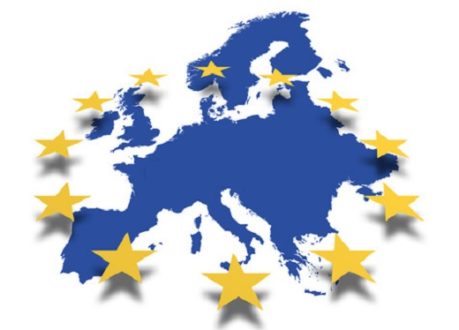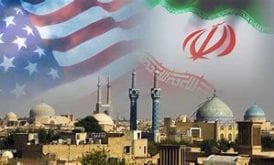Al-Monitor – The recent visits to Washington by French President Emmanuel Macron and German Chancellor Angela Merkel were in all likelihood the last chance for Europeans to convince President Donald Trump not to withdraw from the Iran nuclear deal. With prospects for winning over Trump fading as the May 12 deadline for sanctions waivers approaches, one might argue that US allies in Europe have lost sight of the prize in the process of appeasing him. Indeed, rather than exclusively focusing on addressing Trump’s stated concerns about the deal, which probably cannot be satisfied anyway, France, Germany and the UK, known as the E3, would serve their interests better by laying out alternative strategies for protecting trade between Iran and the European Union should the United States withdraw.
Without concrete plans of action in place and solid assurances to the Iranians about the preservation of the economic benefits of the Joint Comprehensive Plan of Action (JCPOA), the E3 may end up being unfairly blamed — by all sides — for its demise. In conversations with Al-Monitor, Iranian officials have stated, on condition of anonymity, that the Islamic Republic long ago warned the E3 that while theoretically there could be a JCPOA in place without the United States, there cannot be an agreement without Iran. In this vein, the Islamic Republic has been insisting that Europe put in place measures such as alternative financing and blocking regulations to protect its businesses in order to provide enough incentives to Iran to remain committed to the JCPOA in the case of US withdrawal.
But at this point, the European strategy of seemingly only trying to accommodate Trump’s demands makes it almost impossible for Iran to remain in the deal should the United States withdraw — at least in the eyes of Iranian officials. As such, the E3 approach to keeping the United States within the deal could potentially result in the loss of both Washington and Tehran in the process. There are three key factors to consider when assessing this problematic prospect.
First, Trump is likely to blame the E3 for being unable to renegotiate and “fix” the deal. After receiving an ultimatum in Trump’s Jan. 12 announcement to “fix the deal’s disastrous flaws, or the United States will withdraw,” the E3 were set on the path to save the deal for their own national security interests. Trump set out several demands, including tougher inspections, removal of the so-called sunset clauses on uranium enrichment limits and sanctions on ballistic missile activity. As reflected in his appointments of national security adviser John Bolton and Secretary of State Mike Pompeo, Trump has also adopted a harsher stance toward Iran in general, generating concerns that a new war in the Middle East could be on the horizon. Europe’s desire to avoid this nightmare scenario has in effect boosted US leverage, giving the Europeans even more reason to focus their efforts on trying to keep Washington in the deal.
Second, Iran can reasonably be assumed to blame the E3 for only resorting to rhetoric in seeking to protect the economic benefits Iran was expecting to derive from the JCPOA. Here, particular note should be made of President Hassan Rouhani’s May 7 statement that “what we want from the nuclear deal is either guaranteed by countries other than America, or if we see that what we want out of the nuclear is not secured, we will have our own path and plans.” Against this backdrop, among the options being weighed by Iranian officials in light of US threats to reimpose sanctions are withdrawal from the JCPOA itself or, much more drastically, withdrawal from the Nuclear Non-Proliferation Treaty. Indeed, as disappointment builds up, hard-line voices in Tehran are increasingly pushing this option.
Both of these outcomes will have dire ramifications for the Nuclear Non-Proliferation Treaty as an institution, nonproliferation in the Middle East and indeed conflicts in the region.
There is a third factor to consider when assessing the situation of the E3: the positions of European countries and businesses who have already invested in Iran. Indeed, these actors are also likely to blame the E3 for the manner in which efforts have been directed toward appeasing Trump rather than standing up for the JCPOA itself. In this scenario, a collapsed nuclear deal would highlight the weaknesses of Europe and the nature of transatlantic relations. If the EU cannot put into practice its legal rights and the economic tools at its disposal to stand on its own feet — which it has loudly stated that it will — both the E3 and the EU will lose credibility as negotiating partners in any future international accord.
Mindful of these pitfalls, the EU should at this point exercise its legal rights and put in place mechanisms to preserve the deal by giving Iran guarantees that European trade and investment will be protected in the event of the reimposition of US sanctions. These mechanisms, which have thus far remained a topic of discussion and rhetoric, should be turned into actual plans of action combined with clearly delineated steps for their implementation. Indeed, it should not be forgotten that Europe could still put forth substantive options, particularly related to trade and banking — including alternative financing options and blocking regulations that would protect European firms from US sanctions — that could provide Iran with the confidence that the JCPOA is worth complying with.
Europe’s moves in the coming days are not only consequential for Iran’s decision-making, but could potentially also have a direct impact on Trump. Indeed, in addition to being faced with the question of whether to withdraw from the JCPOA, the US president must choose whether his exit from the deal will be “soft” or “hard.” In this equation, Europe’s decisions will have significant implications for the standing of the EU as an independent global actor that can hold its ground on matters of vital importance for the union. As such, the EU is faced with perhaps its only shot to salvage both the nuclear agreement and its credibility in future negotiations with Iran.
Mahsa Rouhi is a research fellow at the International Institute for Strategic Studies, Nonproliferation and Nuclear Policy Programme. She is also an associate of the Project on Managing the Atom and International Security Program at Kennedy School’s Belfer Center for Science and International Affairs. Rouhi received her PhD from King’s College, University of Cambridge, UK. Her research primarily focuses on nuclear policy and security strategy in the Middle East region, Iran in particular.
 Shabtabnews In this dark night, I have lost my way – Arise from a corner, oh you the star of guidance.
Shabtabnews In this dark night, I have lost my way – Arise from a corner, oh you the star of guidance.



